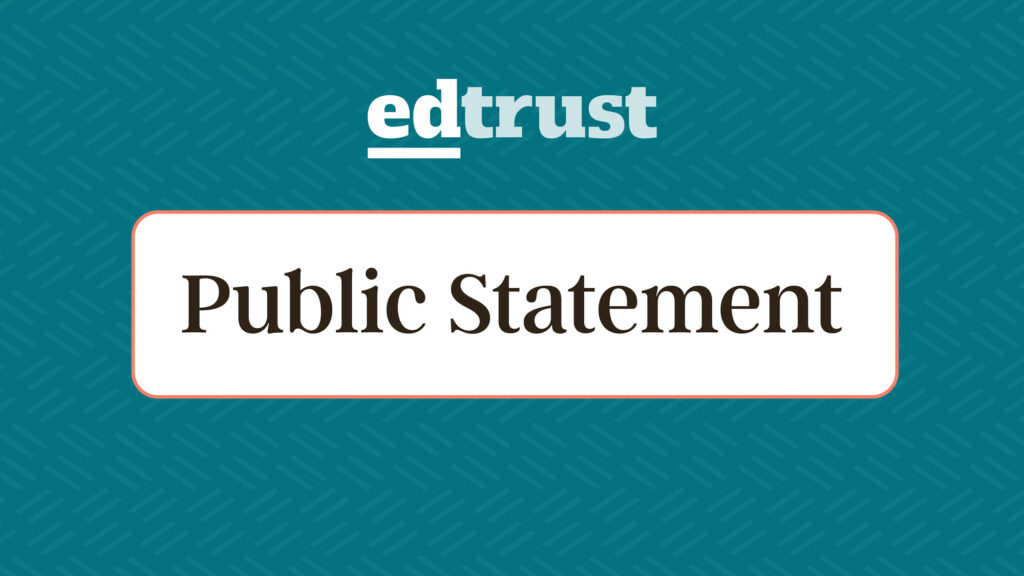“The National Assessment of Educational Progress (NAEP) results released on Monday highlight the impacts of the COVID-19 pandemic on student learning and the urgency of ensuring that all of our state’s young people get the support they need to thrive.
“Yes, Massachusetts managed to hold onto its high overall rankings on NAEP. But how meaningful are those rankings when today’s NAEP results are the lowest they have been in nearly 20 years? How much value do those rankings hold when the results tell us that less than half of our fourth graders are proficient readers? That just over a third of our 8 th graders are proficient in math?
“The results released this week are also a reminder of the importance of digging beneath statewide averages to understand how well our education system is working for all Massachusetts students. The Commonwealth may rank first for students overall in 4 th -grade reading, for example, but for Latinx students, it ranks 23 rd out of 47 states with data for this population. In addition, NAEP results show that just 16% of 8 th graders from families with low-incomes are proficient in math, while nearly half score below even the basic level. The results for their higher-income peers are the exact opposite – 49% are proficient or advanced, and just 17% score below the basic level.
“The data is not surprising and affirms what we already knew: Massachusetts’ education system was deeply unequal long before COVID-19 . For years, data have laid bare systemic disparities that undermined the educational experiences and outcomes of students of color, students from low-income families, English learners, and students with disabilities in our state. The pandemic, which disproportionately impacted these same student populations and their families, both shone a light on and exacerbated pre-existing inequities.
“Notably, the results are also not, in any way, a reflection of students’ ability to learn. Rather, they are a reflection of the inequitable resources, learning experiences, and opportunities granted to our young people, especially – despite educators’ often heroic efforts – in recent years. They are a call to action to state leaders to make education equity a top priority and to ensure that our education system does not revert to a pre-pandemic normal that did not work for hundreds of thousands of our young people.
“Here are just some actions state leaders can take to help turn the sobering trends in this year’s NAEP results around:
- Require and support all districts to develop and publicize pandemic recovery plans outlining how they will accelerate learning and support student well-being, and how they will use federal pandemic recovery funds and incoming Student Opportunity Act (SOA) dollars in these efforts. Ensure that these plans include disaggregated numeric progress targets for helping students catch up and descriptions of resources that will be provided to students and families.
- Ensure that all districts are using culturally responsive, standards-aligned instructional materials, including research-based approaches to early literacy and that educators get the support they need to implement any curricular changes.
- Provide guidance and resources to help districts become community hubs that can connect families to community resources and services to ensure that all students and families receive the mental health, academic, and wraparound supports they need.
- Invest in school leaders to create schools where students and teachers want to be . Fund high-quality coaching and professional development on creating culturally sustaining learning environments and working conditions.
- Shine a light on educational inequities to prompt action . Any press statement or report should highlight how our education system is doing not just on average, but for each student population – especially populations long underserved in our schools.
“The Education Trust in Massachusetts has been working with our partners in the Massachusetts Education Equity Partnership (MEEP) to develop resources for how state leaders can support an equitable pandemic recovery, including MEEP’s recently released report, There Is No Excellence without Equity. MEEP has also released a toolkit for how district leaders can leverage pandemic recovery funds to address new and long-standing educational disparities; see Keeping Equity at the Forefront: Pandemic Recovery.”
“Importantly, education leaders cannot and should not attempt to tackle new or long-standing equity challenges alone. Creating a more equitable system must start with learning from the people it impacts most – the students and families who have long been underserved in our schools, and the educators and community leaders that support them. Only by drawing on the expertise of people with lived experience, and supplementing that expertise with research and evidence, will Massachusetts become a No. 1 state for all of its students.






 September 12, 2025 by
September 12, 2025 by